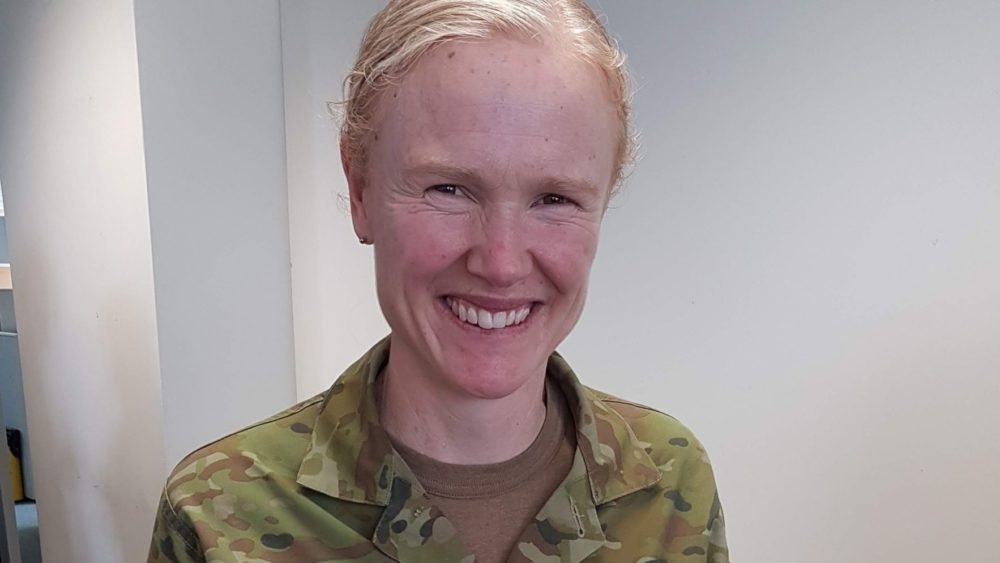An officer and a gentle woman
Carney Elias is not a spokeswoman or expert on what to do at work. She wants to make that clear.
But the career officer with the Australian Defence Force is a key speaker at conferences around Australia that focus on how to live out your Christian faith at work.
“We have to be careful those masks don’t stop us from engaging honestly with our peers …” – Carney Elias
“I struggle with these kinds of things because I’m not really any good at this. I’m not a great example for people to look at,” says Lieutenant Colonel Elias, who is a deputy director within ADF’s logistics core, providing types of support to combat troops.
“We have to be careful those masks don’t stop us from engaging honestly with our peers or people around us.” – Carney Elias
Elias’s modest self-assessment flies in the face of audience reactions to her talks about identity at the Life@Work Conferences, a touring national event by evangelism enterprise City Bible Forum. She’s been received well when candidly discussing being a Christian at the office which, for her, includes deployments to Iraq, Papua New Guinea and the Solomon Islands.
In 2005, she was embedded in the ‘Green Zone’ in Baghdad, as the ‘Coalition of the Willing’ nations installed a provisional government in Iraq. Elias was part of an international team charged with equipping local military and police against insurgent forces.
As Elias shares the Life@Work platform with prominent Christian leaders such as economist Ian Harper and Sydney University vice-chancellor Michael Spence, she hopes that being honest about her struggles with who she is at work encourages others to think about their own jobs. While she believes there are appropriate times to put on a “mask” and dive into tasks or situations you might not want to, Elias emphasises the importance of knowing when to remove the mask and reveal the real you.
“We have to be careful those masks don’t stop us from engaging honestly with our peers or people around us, in situations where we should actually be open and vulnerable with people in order to love them better – and to engage with them more – so we can point them to Jesus.”
Elias has served in the ADF for more than two decades, having headed there straight after high school. As someone who started to own her faith in her early twenties and has developed “increasing understanding” of what it means to live a Christian life, Elias doesn’t think her personal beliefs make her dramatically stand out among her peers. Except, perhaps, she has a more “nuanced view” about right and wrong in complex situations. “Yes, there may be a conflict that in all senses could be considered just or ethical, but those people [caught up in it] are still God’s creations – people he has created and loves.”
“There is a range of things that, as Christians, we would like the government to be applying when it is thinking about using its military to apply force.” – Carney Elias
Being in the military is one of those jobs that cause Christians, generally, some angst. Elias has met many who question her choice and she has had to deeply consider “what does God have to say about” such a role. One of the reasons Elias is part of the ADF is she that thinks Christians – as in so many industries – should be part of shaping how our military operates. They shouldn’t be absent from such influential realms.
“[Also] God appoints authorities and structures and governments, and the military is part of that,” she continues . “It’s a way that we have order in society. And we have tools that those authorities appointed by God have to use.
“Then there are frameworks for making decisions about ‘just war’ and ethical engagements. There is a range of things that, as Christians, we would like the government to be applying when it is thinking about using its military to apply force.”
“I’m trying to come back to being saved by Christ’s work, not my own.” – Carney Elias
Elias says her faith has influenced her more than her gender in her career, despite working in an industry traditionally dominated by men. “Being a female in the military has been something I have had to contend with but, at the same time, I think the organisation has come a long way, particularly during the time I have been part of it.
“I think I’ve been very fortunate but most women I come into contact with or have worked with, would say the same – [that] it doesn’t play a role in our day-to-day lived experienced of life in the military.”
However, she notes how women before her have forged a path in the armed forces which, undoubtedly, opened an important path for her. It’s a way of working that, for Elias, continues to challenge her default setting of wanting to do things out of “guilt or obligation”. Elias wants everyone to move beyond doing things out of duty or a “salvation of works”, and to marry up what they understand about Jesus with how they live it out.
“It’s a very much a work in progress for me,” says Elias. “It doesn’t make me a better person in his eyes to do something out of guilt and obligation because he has already paid the price for my sinfulness.
“I’m trying to come back to being saved by Christ’s work, not my own.”





